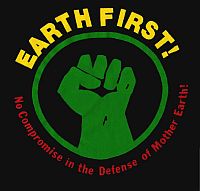http://gizmodo.com/5065587/greenpeace-o … ood-enough
 So Apple, in response to the environmentalist outcry over the past few years, that their products are harmful to the environment (which I am for reducing toxins I might add), stepped up their efforts to make good on reducing the amount of damage they cause in towns like China where they are produced, as well as issues such as the cancer-causing toxic fumes reported to be burning off of the motherboards. So, as this article says, with one hand, environmentalists are patting Apple on the head and saying, “Good job,” while apparently the other hand is still chastising them for not doing enough. What is enough for an environmentalist, I ask?
So Apple, in response to the environmentalist outcry over the past few years, that their products are harmful to the environment (which I am for reducing toxins I might add), stepped up their efforts to make good on reducing the amount of damage they cause in towns like China where they are produced, as well as issues such as the cancer-causing toxic fumes reported to be burning off of the motherboards. So, as this article says, with one hand, environmentalists are patting Apple on the head and saying, “Good job,” while apparently the other hand is still chastising them for not doing enough. What is enough for an environmentalist, I ask?
This leads me to one fundamental conclusion: as long as humans are alive and consume anything, anything at all, whether it is food such as plants, animals, or if we use wood for building houses to live in, or use cars for transportation, fuels for energy, environmentalists will complain and fight all forms of technology that advance society. Now that doesn’t mean we have no responsibility to take care of the Earth as Christians. But it does mean that it should not become our god as it has for the environmentalist movement who opposes the God of the Bible (for the most part, with exceptions of course).
This leads me to more thought at a worldview level of where we as Christians are coming from and where our environmentalist friends are coming from. Are humans more valuable than anything else on the face of the planet as the Scriptures say, or are they of the same worth, value and honor as everything else that exists, which makes us just common place amongst a host of other organisms and matter? For instance, does a plant, as has been dictated in Switzerland by their governmental ethics board, have just as many inherent “rights” as humans and as much God-given value and honor? Or are humans distinct in honor and value apart from all other things in creation as has been ordained by our Creator?
Now my presupposition with all of this is that God is the Creator of all things and created all for His glory. In addition, I believe people were created in the image of God, to reflect His glory and attributes. The evolutionist/environmentalist does not believe any of this and so just as belief in the God of the Bible guides all my other beliefs and decisions, so also their underlying beliefs about reality (based largely outside of any text or manuscript, but based in very large assumptions that have been widely accepted by the scientific community) guide all of their other decisions regarding the world and our role as humans in it. These beliefs naturally and logically lead them to conclude we have no more inherent worth than that of a rock.
The Christian worldview says humans were created by God as His crowning achievement, made in His image and possess more inherent worth than any other of His creations. The evolutionist/environmentalist worldview (though not all environmentalists I might add) explain humans away as just a series of chemical and biological reactions that just happened to come into existence by chance, survival of the fittest or natural selection. Therefore, what worth do we have as humans that is more than that of other creatures, they seem to ask on an almost constant basis, at least implicitly?
This exposes the fundamentally different ways of viewing humanity and our use of the environment. Both camps believe (or should at least) that we should care for and protect the environment. Yet the reason why we should do this is what splits us. The Christian worldview says that we should take care of the environment out of our glory to God and thankfulness for what He has granted us to live in. The environmentalist (who for the most part holds to a evolutionist worldview) is merely a survivalist, believing humans to possess no more worth than that of a rock or plant and then applying the same worth and value we possess as humans, as granted to us by our Creator, to that of other objects with which we come into contact.
At what point will environmentalists cease their varied agendas? In their worldview, until humans are using no resources or are using only the most limited amounts possible to the point where there is no progress made at any level in our civilization, will their endeavors be complete. So should environmentalist policies and legislation be imposed on the collective society so that everyone must abide by their assumed rules? Is this not the very thing the same kinds of people accuse Christians of doing, imposing moral laws on the collective society? Do they not believe their proposed laws to be rules that are morally correct for all people and that we all should abide by them?
As Greg Koukl insightfully points out in his lecture on Relativism, and this whole discussion proves as a case in point, when you really get down to it, morality is the only thing you can legislate. This is clear between both the Christian and environmentalist worldviews. Now I don’t believe you can bring people to salvation through legislation (what many on the Christian right seem to assume), all the while ignoring the actual changing of people’s hearts by the Holy Spirit.
But the question is, which one of the meta-narratives for our existence is true? The Christian worldview that values humans above all in creation? Or an atheistic, evolutionist, radical-environmental worldview which believes humans to be of equal worth and dignity as anything else that exists, like plants now? I would argue it takes way more faith to believe we got here from nothing than to believe God was always there, self-existent, creating us and all things out of nothing by His infinite power. The latter at least logically makes more sense for how we got here and what our point of existence is: to find our ultimate joy and fulfillment in giving glory to God through Jesus, not in trying to save a world marred by the fall, though of course we sinners can make it worse off a lot faster if we’re not careful by how we use resources.

 Quoting anonymously from the The Shack Facebook group, discussing my post found
Quoting anonymously from the The Shack Facebook group, discussing my post found 